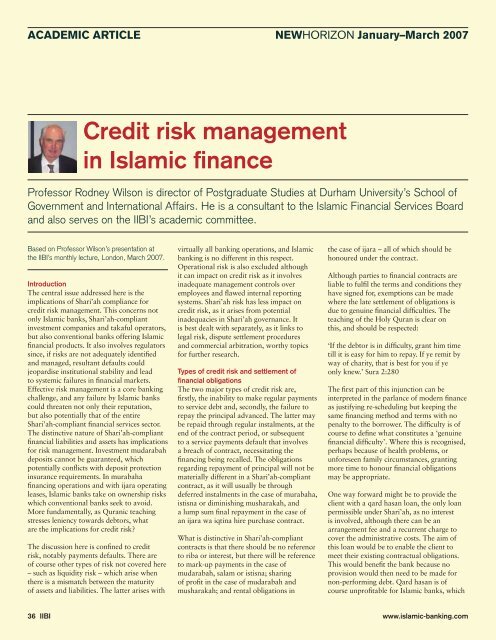issue no. 163 - january–march 2007 / muharram–rabi al awwal 1428
issue no. 163 - january–march 2007 / muharram–rabi al awwal 1428
issue no. 163 - january–march 2007 / muharram–rabi al awwal 1428
- No tags were found...
You also want an ePaper? Increase the reach of your titles
YUMPU automatically turns print PDFs into web optimized ePapers that Google loves.
ACADEMIC ARTICLE<br />
NEWHORIZON January–March <strong>2007</strong><br />
Credit risk management<br />
in Islamic finance<br />
Professor Rodney Wilson is director of Postgraduate Studies at Durham University’s School of<br />
Government and Internation<strong>al</strong> Affairs. He is a consultant to the Islamic Financi<strong>al</strong> Services Board<br />
and <strong>al</strong>so serves on the IIBI’s academic committee.<br />
Based on Professor Wilson’s presentation at<br />
the IIBI’s monthly lecture, London, March <strong>2007</strong>.<br />
Introduction<br />
The centr<strong>al</strong> <strong>issue</strong> addressed here is the<br />
implications of Shari’ah compliance for<br />
credit risk management. This concerns <strong>no</strong>t<br />
only Islamic banks, Shari’ah-compliant<br />
investment companies and takaful operators,<br />
but <strong>al</strong>so convention<strong>al</strong> banks offering Islamic<br />
financi<strong>al</strong> products. It <strong>al</strong>so involves regulators<br />
since, if risks are <strong>no</strong>t adequately identified<br />
and managed, resultant defaults could<br />
jeopardise institution<strong>al</strong> stability and lead<br />
to systemic failures in financi<strong>al</strong> markets.<br />
Effective risk management is a core banking<br />
ch<strong>al</strong>lenge, and any failure by Islamic banks<br />
could threaten <strong>no</strong>t only their reputation,<br />
but <strong>al</strong>so potenti<strong>al</strong>ly that of the entire<br />
Shari’ah-compliant financi<strong>al</strong> services sector.<br />
The distinctive nature of Shari’ah-compliant<br />
financi<strong>al</strong> liabilities and assets has implications<br />
for risk management. Investment mudarabah<br />
deposits can<strong>no</strong>t be guaranteed, which<br />
potenti<strong>al</strong>ly conflicts with deposit protection<br />
insurance requirements. In murabaha<br />
financing operations and with ijara operating<br />
leases, Islamic banks take on ownership risks<br />
which convention<strong>al</strong> banks seek to avoid.<br />
More fundament<strong>al</strong>ly, as Quranic teaching<br />
stresses leniency towards debtors, what<br />
are the implications for credit risk?<br />
The discussion here is confined to credit<br />
risk, <strong>no</strong>tably payments defaults. There are<br />
of course other types of risk <strong>no</strong>t covered here<br />
– such as liquidity risk – which arise when<br />
there is a mismatch between the maturity<br />
of assets and liabilities. The latter arises with<br />
virtu<strong>al</strong>ly <strong>al</strong>l banking operations, and Islamic<br />
banking is <strong>no</strong> different in this respect.<br />
Operation<strong>al</strong> risk is <strong>al</strong>so excluded <strong>al</strong>though<br />
it can impact on credit risk as it involves<br />
inadequate management controls over<br />
employees and flawed intern<strong>al</strong> reporting<br />
systems. Shari’ah risk has less impact on<br />
credit risk, as it arises from potenti<strong>al</strong><br />
inadequacies in Shari’ah governance. It<br />
is best de<strong>al</strong>t with separately, as it links to<br />
leg<strong>al</strong> risk, dispute settlement procedures<br />
and commerci<strong>al</strong> arbitration, worthy topics<br />
for further research.<br />
Types of credit risk and settlement of<br />
financi<strong>al</strong> obligations<br />
The two major types of credit risk are,<br />
firstly, the inability to make regular payments<br />
to service debt and, secondly, the failure to<br />
repay the princip<strong>al</strong> advanced. The latter may<br />
be repaid through regular inst<strong>al</strong>ments, at the<br />
end of the contract period, or subsequent<br />
to a service payments default that involves<br />
a breach of contract, necessitating the<br />
financing being rec<strong>al</strong>led. The obligations<br />
regarding repayment of princip<strong>al</strong> will <strong>no</strong>t be<br />
materi<strong>al</strong>ly different in a Shari’ah-compliant<br />
contract, as it will usu<strong>al</strong>ly be through<br />
deferred inst<strong>al</strong>ments in the case of murabaha,<br />
istisna or diminishing musharakah, and<br />
a lump sum fin<strong>al</strong> repayment in the case of<br />
an ijara wa iqtina hire purchase contract.<br />
What is distinctive in Shari’ah-compliant<br />
contracts is that there should be <strong>no</strong> reference<br />
to riba or interest, but there will be reference<br />
to mark-up payments in the case of<br />
mudarabah, s<strong>al</strong>am or istisna; sharing<br />
of profit in the case of mudarabah and<br />
musharakah; and rent<strong>al</strong> obligations in<br />
the case of ijara – <strong>al</strong>l of which should be<br />
ho<strong>no</strong>ured under the contract.<br />
Although parties to financi<strong>al</strong> contracts are<br />
liable to fulfil the terms and conditions they<br />
have signed for, exemptions can be made<br />
where the late settlement of obligations is<br />
due to genuine financi<strong>al</strong> difficulties. The<br />
teaching of the Holy Quran is clear on<br />
this, and should be respected:<br />
‘If the debtor is in difficulty, grant him time<br />
till it is easy for him to repay. If ye remit by<br />
way of charity, that is best for you if ye<br />
only knew.’ Sura 2:280<br />
The first part of this injunction can be<br />
interpreted in the parlance of modern finance<br />
as justifying re-scheduling but keeping the<br />
same financing method and terms with <strong>no</strong><br />
pen<strong>al</strong>ty to the borrower. The difficulty is of<br />
course to define what constitutes a ‘genuine<br />
financi<strong>al</strong> difficulty’. Where this is recognised,<br />
perhaps because of he<strong>al</strong>th problems, or<br />
unforeseen family circumstances, granting<br />
more time to ho<strong>no</strong>ur financi<strong>al</strong> obligations<br />
may be appropriate.<br />
One way forward might be to provide the<br />
client with a qard hasan loan, the only loan<br />
permissible under Shari’ah, as <strong>no</strong> interest<br />
is involved, <strong>al</strong>though there can be an<br />
arrangement fee and a recurrent charge to<br />
cover the administrative costs. The aim of<br />
this loan would be to enable the client to<br />
meet their existing contractu<strong>al</strong> obligations.<br />
This would benefit the bank because <strong>no</strong><br />
provision would then need to be made for<br />
<strong>no</strong>n-performing debt. Qard hasan is of<br />
course unprofitable for Islamic banks, which<br />
36 IIBI www.islamic-banking.com
















